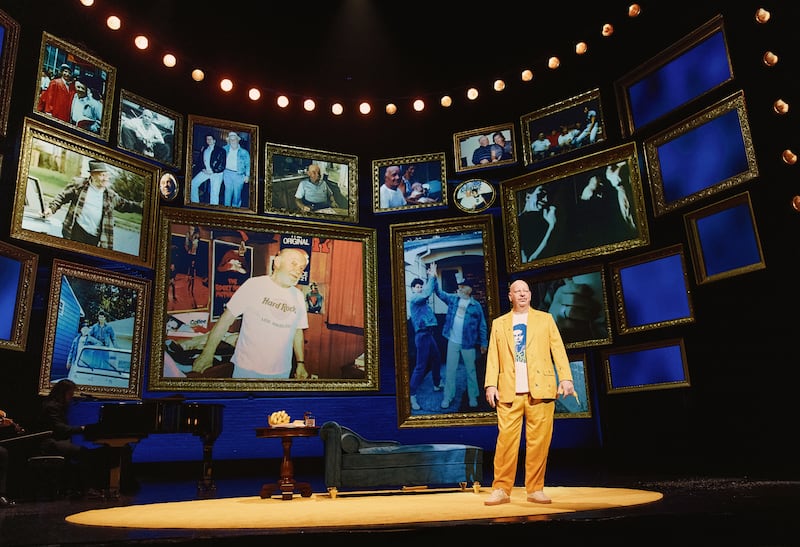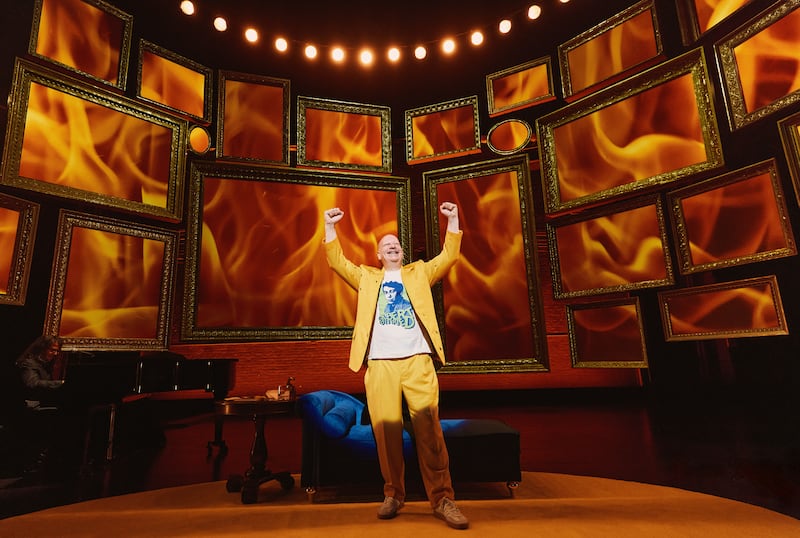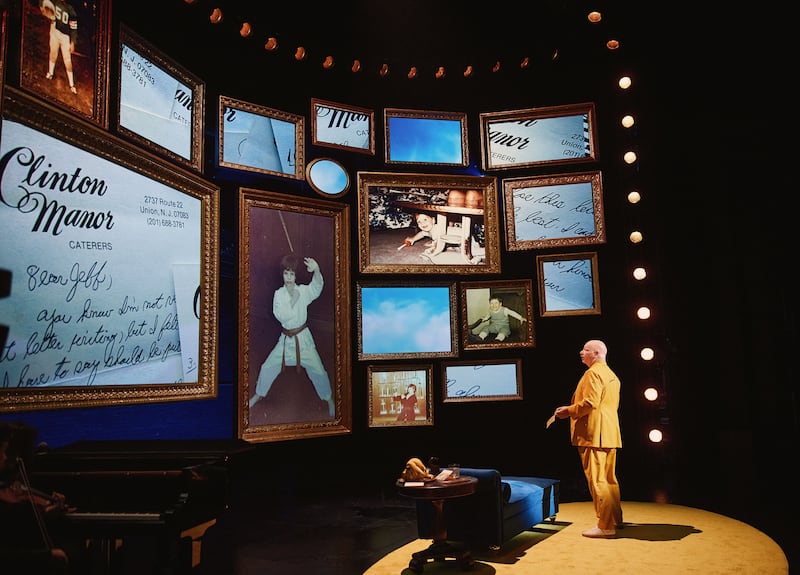Jeff Ross is about to get very personal. He also wants to make it clear that he hasn’t gone completely soft in his one-man written and performed Broadway show, Take a Banana for the Ride (Nederlander Theatre, through Sept. 28). First to get insulted are those in his immediate sight-lines in the front row: their fashion, bodies, and private lives are briskly impugned.
Ross is nicknamed “The Roastmaster General” for a reason—and the tension in this show, a self-patrolled tightrope, is watching the reigning king of all-chopping jabs and insults aimed at fellow celebrities spend most of 90 minutes revealing a private life of anguish and tragedy.
In a sometimes beguiling and sharp, sometimes woolly and unfocused show directed by Stephen Kessler, these stories themselves come with lacerating jokes (like an early sequence about his appearance, including his alopecia). To open his meditation on mortality, he lovingly skewers his friends and recently deceased comedic peers, Bob Saget, Norm Macdonald, and Gilbert Gottfried.
His gags in the show are just as did-he-just-say-that? gasp-worthy as fans relish. But threaded between these jokes is the story of a man who has confronted the very personal possibility of death, while contemplating the cumulative effects of the deaths and losses of those closest to him, principally his parents when he was young.

We follow his life, first growing up with them in New Jersey, the title of the play coming from a piece of advice his spry and very supportive grandfather Jack gave the young Jeff when the latter took the bus into Manhattan: always have a banana on hand just in case.
It’s the kind of throwaway advice children never think about, and while it’s light-heartedly offered it’s only when one gets older that the advice takes on a different hue. The “just in case” comes down to the adult knowledge of all of life’s possible negatives, obstacles, and disasters. A banana may not make for a robust weapon against these fateful detonations, but it’s something—just like Ross’ two beloved German Shepherd dogs—that provides a ballast of comfort. The banana here is a talisman of care. For Ross, a banana is also a metaphor for a human being: hard skin, mushy insides.
Ross’s show unfolds in the whiplash structure of the deadly serious meets deadly funny and proudly profane (his song, “Don’t F--- With the Jews,” was received with both scattered laughter and silence).
Ross later reveals the treatment he had for a stage three tumor in his colon that he endured last year. But—no spoiler!—he lived, and more than the hospital stay and recovery itself, what sticks in his and our minds is Ross’ own celebratory amazement that he had built a community of loved ones around him who would take care of him through his convalescence.

The self-realization of what that care means is accompanied by a panoply of projected images of those loved ones, adding to a lovely moment of overwhelm—almost as if Ross cannot believe his own good fortune, his own luck, that in a life strewn with so much sadness he has managed to build this sustaining group of family and friends. As a young person, Ross’ expectation that followed the losses of his parents was that more losses would inevitably follow. But look, he seems to be saying—as wide-eyed and joyful as James Stewart at the end of It’s a Wonderful Life—at what he has gained.
A talent for comedy, a life of perfecting that art and building connections through it (and a beloved sister), were the foils for whatever countervailing forces would drag Ross down. On stage he wears a banana-yellow suit with sequins, designed by Toni-Leslie James. It looks ridiculous, but it’s really a suit of armor, a manifestation of that soft fruit weapon his grandfather made sure he had for the bus.

Stefania Bulbarella’s projections and Adam Honoré’s lighting are secondary stars of the show, cleverly designed to illuminate a living scrapbook of images and memories unfolding in perfect tandem to Ross’ jokes and stories.
Ross’ pensive softness is broken by one final visit to the audience, camera crew in hand. Here the Roastmaster General is back on the insult-prowl. Willing victims offer themselves up for Ross’ putdowns for gifts of bananas. He’s merciless with almost every audience member; the only one to escape a withering insult the night I was there had themselves suffered and survived a terrible illness. Suddenly Ross could only sigh and sympathize, all his zinger-sharpened edges momentarily hidden under that ridiculous but extremely snug yellow suit of armor.









